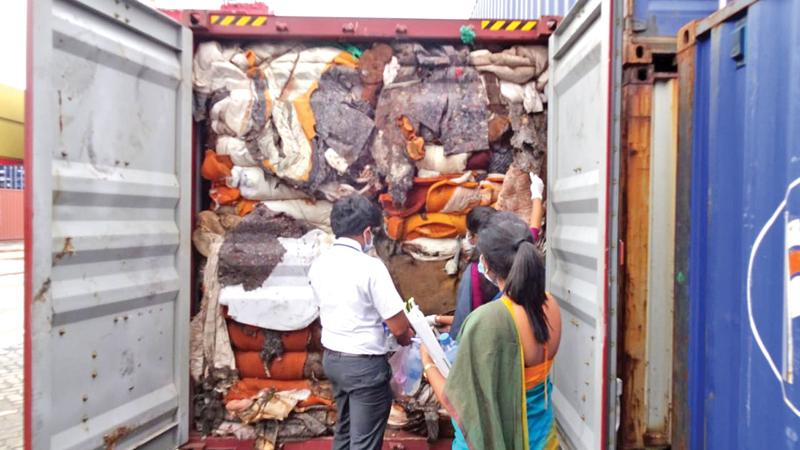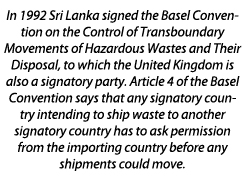
The recently exposed garbage import trade and accompanying dumps of tons of possibly toxic waste material can be traced back to two brothers, one operating in the United Kingdom and the other at the Sri Lankan end busily ‘trading’ in garbage. The end result has been container loads piled up in the Free Trade Zone, Katunayaka and, in the Colombo Port for the past one and half years with serious environmental pollution concerns, an official told the Sunday Observer.
 The official, who wished to remain anonymous revealed, that the exporter company, Vengaads Limited of No. 23, Seward Stone Gardens, London, is owned by Vengadesha Muthuramar, and the importer company, Ceylon Metal Processing Cooperation (Pvt) Limited, Colombo, is owned by brother Sasikumaran Muthuramar. Their ‘trading’ operation which involved bringing garbage into Sri Lanka under the import category of used mattresses, is currently under probe.
The official, who wished to remain anonymous revealed, that the exporter company, Vengaads Limited of No. 23, Seward Stone Gardens, London, is owned by Vengadesha Muthuramar, and the importer company, Ceylon Metal Processing Cooperation (Pvt) Limited, Colombo, is owned by brother Sasikumaran Muthuramar. Their ‘trading’ operation which involved bringing garbage into Sri Lanka under the import category of used mattresses, is currently under probe.
A total of 241 containers of garbage have been imported into the country during the period September 2017 to March 2018. Of this consignment, 130 containers were stored in the Free Trade Zone which is under the Board of Investment’s (BOI) purview.
Cutoms investigation
The Sri Lanka Customs launched an investigation into the matter on May 7, 2019, after a tip-off that some 111 containers had been lying un-cleared in the Colombo port since March 2018. The Customs investigation led to the 130 containers dumped in the Free Trade Zone. Documents show that scrap metal from 20 of the 130 containers had been separated and packed into seven containers and shipped to India and Dubai. Another 10 containers, unopened, were also shipped to these two countries.
The containers were imported to Sri Lanka under the ‘entrepôt trading license’ which allows all goods brought under it to be exempt from inspections and monitoring procedures of the Customs, Import Controller, and Exchange Controller, and be directly handled by the BOI. This was provided for by amendments to the Finance Act No. 12 of 2012 made through notification in the Gazette Extraordinary 1818/30 of July 2013.
Therefore, these imports are not physically checked by the Customs, Import Controller, or Exchange Controller. Nor do these agencies conduct any entry processing or check on documents. Thus, the company that imported the garbage did so taking advantage of its registration with the BOI under the Greater Colombo Economic Commission Act.
Speaking to the Sunday Observer, Acting Media Spokesperson for Sri Lanka Customs, Lal Weerakoon, identified four key responsible parties in the ongoing garbage controversy. They are the BOI, which signed an agreement with Hayleys Free Zone as a BOI-registered company,logistics provider ETL Colombo Ltd.which signed an agreement with Hayleys Free Zone and, finally, the importer firm, Ceylon Metal Processing Cooperation (Pvt) Ltd.which had signed an agreement with ETL Colombo.
“At this stage we can’t ascertain precisely who was responsible for all this garbage ending up in our country. The Customs is investigating the matter,” Weerakoon said.
Thus, what the garbage in the 111 containers consists of remains a potentially toxic mystery. Officials are not opening the containers fearing environmental contamination due to the heavy odour and fluid oozing from them. Some claim that the garbage consignment includes clinical waste. The BOI and the Central Environment Authority (CEA) have now begun probing this garbage hoard that was left exposed to the open air in a 50,000 square foot facility at the Free Trade Zone. Meanwhile, the exporter country, the United Kingdom, is also under fire for violating international law.
Basel Convention
In 1992 Sri Lanka signed the Basel Convention on the Control of Transboundary Movements of Hazardous Wastes and Their Disposal, to which the United Kingdom is also a signatory party.
Article 4 of the Basel Convention says that any signatory country intending to ship waste to another signatory country has to ask permission from the importing country before any shipments could move.
The United Kingdom had failed to get the shipment cleared from Basel’s focal point in Sri Lanka - the CEA. The UK has now launched its own investigation into the whole messy affair this week.
Meanwhile, Finance Minister Mangala Samaraweera answered questions raised about the garbage containers in Parliament on Friday. The Minister said that, based on an initial inquiry conducted by Customs, 241 containers consisting of waste has been imported to Sri Lanka during September 27, 2017, to March 2, 2019. Of this, 111 containers belong to ETL Colombo Pvt Ltd with the notifying party being Ceylon Metal Processing Corporation Pvt Ltd.
However, the Customs had conducted an inquiry into the 65 containers remaining at the Colombo port, in the presence of ETL Colombo Pvt Ltd, CEO Sashikumaran Muthuramar and officials of the Central Environmental Authority (CEA).
According to the Finance Minister, these garbage consignments were recognised as‘mixed waste material’ while it had been imported in contravention of the ‘Basel Convention’ and also without prior approval of the CEA.
The Minister promised Parliament that he would conduct a comprehensive investigation into the matter through the Department of Customs and would take legal action against the culprits.
Court petition
Additionally, the Court of Appeal (CoA) took up a petition filed by Hemantha Withanage, the Executive Director of the ‘Centre for Environmental Justice’, a Colombo-based Non-Governmental Organisation last Thursday. The Central Environmental Authority, Sri Lanka Customs and the Attorney General’s department had been named as respondents of the case.
The petitioner informed the court that the garbage containers are in two locations as two separate consignments: 102 containers in the Colombo International Container Terminal (CICT) in the Colombo Port and, 122 containers in the Free Trade Zone in Katunayake in the Naikanda Board of Investment (BOI) premises.
After considering the remarks made by the petitioner’s counsel, CoA President Justice Yasantha Kodagoda instructed the petitioners to include the Board of Investment and Hayleys Free Zone Limited also as respondents in the case.
Meanwhile, Senior Counsel Romesh De Silva PC, who appeared on behalf of Hayleys Advantis, the parent company of Hayleys Free Zone, informed the courts that the consignment in the Colombo Port premises did not belong to his client (Hayleys). He also submitted that the 122 containers in the Katunayake BOI zone belonged to Hayleys but they did not include any clinical waste.
“Those materials are to be value-added and re-exported. They do not enter into the local market,” the counsel assured the court. He also said that those 122 containers which are originally from the United Kingdom, did not derive from any hospital or medical institute, to the best of his knowledge. That consignment only consisted of used mattresses and no other waste attached, he informed the court.
PC Romesh De Silva further said that the material in the BOI import consignment had not been added to the waterways nearby as it was mentioned in the petition. But he admitted that a part of the consignment was now fully exposed to the environment. Hayleys is in the process of re-filling them into containers.
Justice Kodagoda expressed the interest of the CoA to receive complete support from the Attorney General concerning the lawsuit. He also instructed the counsel who represented the Attorney General to issue an order to the Director-General of Customs to maintain the status quo concerning the two consignments.
The case was adjourned until July 29 (tomorrow).
